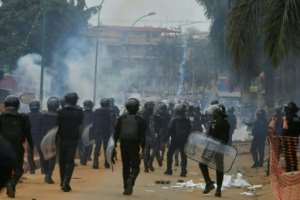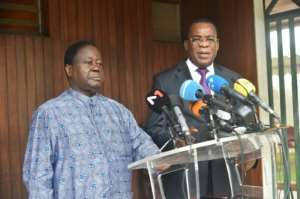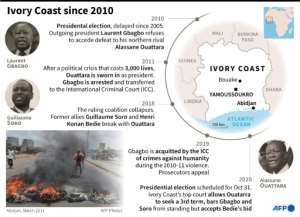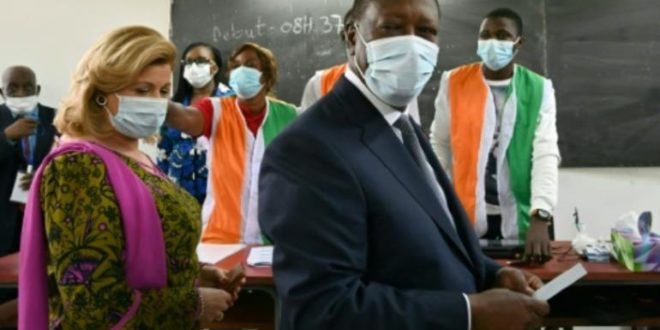Ivory Coast opposition leaders on Sunday called for a “civilian transition” from President Alassane Ouattara’s government, a day after an election they boycotted in protest over his contested bid for a third term.
Clashes erupted in Ivory Coast in August when Ouattara said a reform allowed him to bypass a two-term presidential limit to run again, angering the opposition who called it an “electoral coup”.
Pre-election violence that killed at least 30 and the opposition protest have stoked fears of a repeat of the 2010-2011 crisis when 3,000 people died after then president Laurent Gbagbo refused to accept defeat by Ouattara.
“Opposition parties and political groups call for the start of a civilian transition,” opposition leader Pascal Affi N’Guessan told reporters as Ivorians awaited the vote’s results.
N’Guessan said they rejected the election and believed Ouattara’s mandate was over, calling for Ivorians to mobilise.
 Clashes broke out in an Abidjan district and in towns in the centre of the country. By Issouf SANOGO (AFP)
Clashes broke out in an Abidjan district and in towns in the centre of the country. By Issouf SANOGO (AFP)
There was no immediate response from the government or ruling party.
Ouattara said on Saturday the election went ahead with only isolated incidents and his ruling RHDP party added it expected the Ivorian leader to win.
Scattered unrest, vandalised voting material and some closed polling stations were reported mostly in opposition strongholds during Saturday’s election though Ouattara had appealed for calm.
The tense election in French-speaking West Africa’s top economy is the latest test for a region where Guinea and Tanzania are caught up in post-election disputes, Nigeria is emerging from widespread unrest and Mali suffered a coup.
The standoff over Ouattara’s third term once again pits the ex IMF economist against old adversary former president Henri Konan Bedie, one of the feuds between ageing leaders that has marked Ivorian politics for decades.
“This is really a difficult situation…. The crisis has not been resolved by the election,” said Professor Arsene Brice Bado at Abidjan’s CERAP research institute.
“The winning party needs to find ways to start a new dialogue.”
– Intercommunal clashes –
At least two people died in clashes on Saturday in central Tiebissou and Oume, a security source said, though a local mayor of Tiebissou said four were killed in his town.
On Saturday, protests degenerated into clashes between ethnic communities who back rival political factions in Tiebissou, Oume, Yopougon, a poor Abidjan district, and in the western town of Gboguhe, according to witnesses.
 Ivorian opposition leaders Henri Konan Bedie (L) and Pascal Affi N’Guessan (R) had called for a boycott. By SIA KAMBOU (AFP)
Ivorian opposition leaders Henri Konan Bedie (L) and Pascal Affi N’Guessan (R) had called for a boycott. By SIA KAMBOU (AFP)
According to the office of Tiebissou’s mayor, a member of Ouattara’s party, some of the 27 injured in the town had gunshot and stab wounds.
The country’s political feuds are often linked with ethnic identities and regional loyalties — in part dating back to the 2002 civil war that split the country in two, north and south.
“October 31 was not the deluge as the leaders of the opposition forecast,” Adama Bictogo, a senior ruling party official, said after the election.
“The popular will was expressed and all the opposition did for months was defend the idea of not holding elections.”
Officials have up to five days to announce the results, but the electoral commission is expected to start releasing initial tallies on Sunday.
Election about-face
Opposition leaders on Saturday already dismissed the election as a failure and several opposition figures, including exiled former rebel chief Guillaume Soro, announced they no longer recognised Ouattara as president.
 Political upheaval in Ivory Coast since the contested 2010 presidential election.. By Gillian HANDYSIDE (AFP)
Political upheaval in Ivory Coast since the contested 2010 presidential election.. By Gillian HANDYSIDE (AFP)
Ouattara, 78, had said after his second term he planned to make way for a new generation, but the sudden death of his chosen successor prompted him to seek a third term.
The Ivorian leader says a constitutional court ruling approved his third term, allowing him to reset the country’s two-term presidential limit according to a 2016 reform.
Bedie, 86, and other opposition leaders had accused the electoral commission and the constitutional court of favouring the government, making a fair vote impossible.
The weeks before the election saw clashes, mainly between local ethnic groups close to the opposition and Dioula communities seen as loyal to the president, himself a Muslim from the north.
When Ivory Coast emerged from a civil war after 2002, the country was split in two, the north held by rebels and the south by forces of then president Gbagbo.
After negotiations, Ouattara won a long-postponed election in 2010 although Gbagbo refused to accept defeat.
Following battles in Abidjan, French forces intervened to help Ouattara loyalists oust the former president.
 Home Of Ghana News Ghana News, Entertainment And More
Home Of Ghana News Ghana News, Entertainment And More




